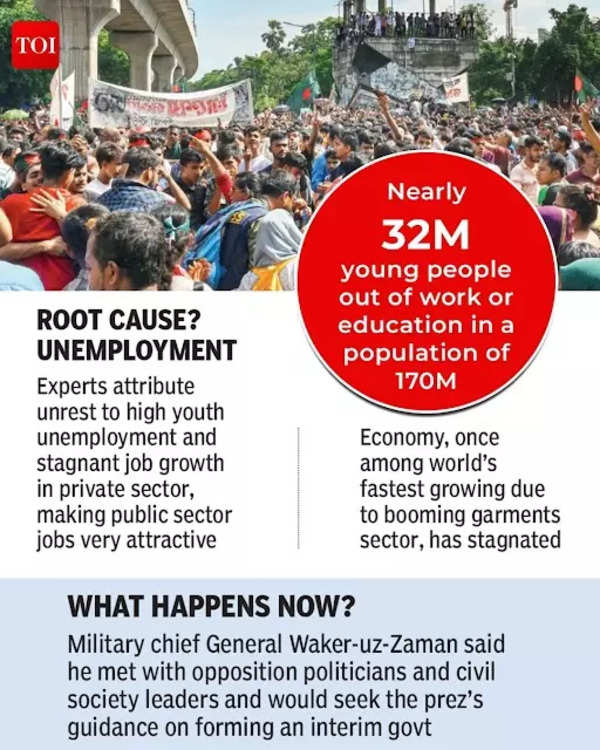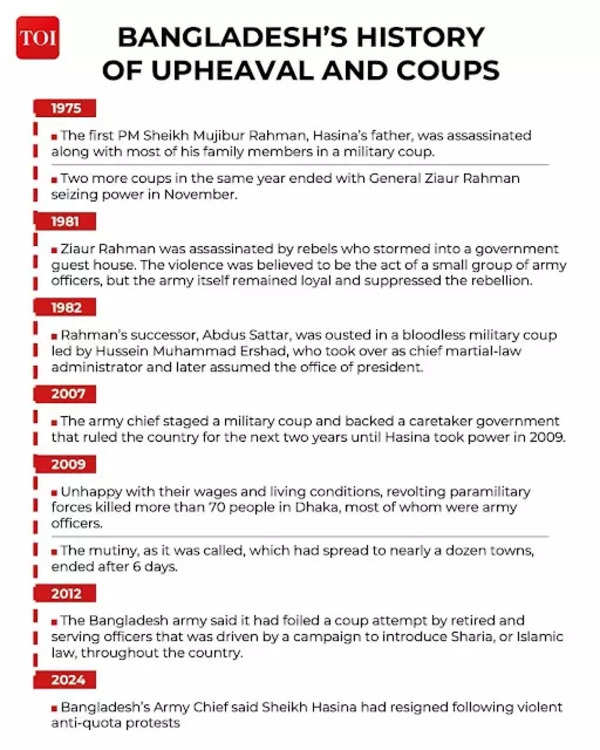[ad_1]
From the Taliban’s takeover in Afghanistan in August 2021 to Imran Khan’s ouster as prime minister in Pakistan in April 2022, and from large protests in Sri Lanka resulting in Gotabaya Rajapaksa fleeing the nation in July 2022 to ongoing unrest in Bangladesh that has already led to the resignation of PM Sheikh Hasina, the political dynamics in South Asia have been completely upended in simply three years.
Afghanistan: Taliban takeover after US exit
The political upheaval in Afghanistan started with the Taliban’s swift army offensive in 2021, culminating of their takeover of Kabul on August 15. This marked the top of the US-backed Afghan authorities, which had been in place because the US invasion in 2001.
The offensive was initiated on Could 1, 2021, coinciding with the withdrawal of US troops, and it quickly escalated because the Taliban captured key provincial capitals and territories throughout the nation.
The autumn of Kabul occurred with little resistance, resulting in the flight of President Ashraf Ghani and the institution of the Islamic Emirate of Afghanistan as soon as once more.
Even US intelligence and defence companies have been left shocked by how shortly the Taliban had recaptured the nation
For the reason that takeover, Afghanistan has confronted a dire humanitarian disaster and worsening ties with Pakistan over terror-related incidents. Islamabad has repeatedly blamed Kabul of harbouring terrorist outfits, which have more and more carried out large and deadly assaults in Pakistan border areas.
The financial system has contracted considerably, with estimates suggesting a 30% decline because the Taliban’s return to energy. Over 28 million folks, or two-thirds of the inhabitants, require pressing humanitarian help, with 17 million going through acute starvation.
The Taliban’s strict interpretation of Islamic legislation has led to extreme restrictions on ladies’s rights, together with bans on training and employment, which have additional exacerbated the financial state of affairs.
The worldwide group’s response has been largely crucial, with many nations imposing sanctions and withholding recognition of the Taliban authorities. Although the Indian authorities has but to formally recognise the Taliban regime because the official Afghanistan authorities, commerce ties proceed to be steady.
Pakistan: Imran Khan’s ouster amid anti-army protests
In Pakistan, the political panorama shifted dramatically with the ousting of Prime Minister Imran Khan in April 2022. Khan, who got here to energy in 2018, was eliminated by way of a no-confidence vote within the Nationwide Meeting, which was seen by many as a fruits of political maneuvering involving the army and opposition events.
Khan’s relationship with the army, which had initially supported him, soured over varied points, together with his makes an attempt to claim civilian management over army appointments and international coverage selections.
The army’s withdrawal of help was pivotal in his political downfall, as they’ve historically performed a major position in Pakistan’s governance. His ouster was adopted by a collection of authorized challenges and accusations of corruption, which Khan and his supporters claimed have been politically motivated.
Following his elimination, Khan’s political struggles intensified. He was arrested in August 2023 on fees associated to corruption and inciting violence in opposition to the army, resulting in widespread protests from his supporters.
The political local weather in Pakistan stays tense, with Khan’s occasion, Pakistan Tehreek-e-Insaf (PTI), going through vital repression.
Pakistan’s financial system is in a precarious state, grappling with excessive inflation, power shortages, a depreciating forex and a looming debt disaster largely resulting from large loans from China for initiatives associated to the Belt and Highway Initiative.
The political instability has additional difficult financial restoration efforts, with worldwide buyers cautious of the state of affairs. The Shehbaz Sharif authorities has secured monetary help from the IMF, however the circumstances tied to such assist has required stringent financial reforms which have fuelled public dissatisfaction.
Sri Lanka: Mass protests pressure Rajapaksa to flee
In July 2022, Sri Lanka skilled unprecedented mass protests that led to the resignation of President Gotabaya Rajapaksa.
The protests have been fueled by widespread discontent over the federal government’s mishandling of the financial system, which had plunged into disaster resulting from a mixture of things, together with the Covid-19 pandemic, rising world gasoline costs, rising debt to China and mismanagement of public assets.
The financial disaster in Sri Lanka manifested in extreme shortages of important items, together with meals, gasoline, and drugs.
Inflation skyrocketed, and the federal government imposed strict measures, akin to energy cuts and gasoline rationing, which additional enraged the populace.
The protests started as peaceable demonstrations however escalated into a bigger motion demanding Rajapaksa’s resignation, culminating within the storming of presidency buildings and his eventual flight from the nation.
Following Rajapaksa’s departure, the brand new authorities led by Ranil Wickremesinghe has confronted the daunting job of addressing the financial disaster and restoring public belief.
The federal government has sought help from worldwide monetary establishments and carried out austerity measures to stabilise the financial system. Nevertheless, public discontent stays excessive, and protests proceed as residents demand accountability and transparency from their leaders.
The nation will likely be holdings its first presidential election because the unrest, on September 21.
Bangladesh: Hasina resigns, flees to India
On August 5, 2024, Bangladesh plunged right into a political disaster after PM Sheikh Hasina out of the blue fled to India after weeks of nationwide protests turned violent wherein no less than 300 folks have been killed.

The protests, initially ignited by college students opposing a authorities employment quota system, quickly developed into widespread demonstrations in opposition to Hasina’s administration resulting from allegations of corruption, financial mismanagement, and harsh crackdown on dissent. The discontent among the many inhabitants was exacerbated by rising inflation and financial challenges, just like these confronted by neighboring nations.
On the day of her resignation, Hasina reportedly fled the nation as protesters superior towards her residence, defying a nationwide curfew.
Subsequently, military chief Common Waker-Uz-Zaman declared {that a} non permanent authorities could be fashioned to revive order.
President Mohammed Shahabuddin on Tuesday, introduced the dissolution of the nation’s parliament to make means for the formation of an interim administration.
In additional improvement, Bangladesh Nationalist Get together (BNP) chairperson Khaleda Zia was launched from jail.
Zia, 78, a former Bangladeshi prime minister, is confined to a hospital resulting from poor well being. In 2018, she was discovered responsible of corruption and given a 17-year jail sentence.
She and Hasina had a long-standing feud and she or he was accused of abusing her place of authority by stealing nearly $250,000 in donations meant for a belief for an orphanage.
The state of affairs within the nation stays tense as authorities attempt to cobble collectively an interim authorities.

Zia and the BNP have traditionally been seen as much less pleasant in direction of India in comparison with her Hasina and her Awami League occasion.
The BNP’s anti-India stance is seen as impressed by the occasion’s founder Ziaur Rahman and his want to distance Bangladesh from India’s affect. The occasion has traditionally been nearer to Pakistan and China, with the ISI allegedly supporting Jamaat-e-Islami Bangladesh to put in a pro-Pakistan authorities throughout BNP rule.
[ad_2]
This Put up might include copywrite


